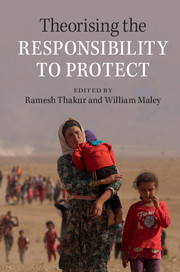Book contents
- Frontmatter
- Contents
- List of figures
- Notes on contributors
- Part I Context
- Part II The Responsibility to Protect, normative theory and global governance
- 5 The Responsibility to Protect and world order
- 6 International law and the Responsibility to Protect
- 7 The Responsibility to Protect, multilateralism and international legitimacy
- 8 Global governance and the Responsibility to Protect
- 9 International law, the Responsibility to Protect and international crises
- 10 The Responsibility to Protect and the just war tradition
- 11 War is not the answer: the Responsibility to Protect and military intervention
- Part III The Responsibility to Protect and international social purposes
- Index
8 - Global governance and the Responsibility to Protect
from Part II - The Responsibility to Protect, normative theory and global governance
Published online by Cambridge University Press: 05 August 2015
- Frontmatter
- Contents
- List of figures
- Notes on contributors
- Part I Context
- Part II The Responsibility to Protect, normative theory and global governance
- 5 The Responsibility to Protect and world order
- 6 International law and the Responsibility to Protect
- 7 The Responsibility to Protect, multilateralism and international legitimacy
- 8 Global governance and the Responsibility to Protect
- 9 International law, the Responsibility to Protect and international crises
- 10 The Responsibility to Protect and the just war tradition
- 11 War is not the answer: the Responsibility to Protect and military intervention
- Part III The Responsibility to Protect and international social purposes
- Index
Summary
Ours is a world in which no individual, and no country, exists in isolation. All of us live simultaneously in our own communities and in the world at large.
Kofi A. Annan.National worldviews have been historically constricted by geography. Even the supposed global conflicts of the twentieth century featured Western powers playing out their political struggles in buffer or proxy states. This world in which social and economic interactions were driven by geographic restrictions, and warfare was primarily conducted between neighbouring nations, is now long gone, however.
The political realities of the past have crumbled as the traditional vehicle for change – technology – has broken down the barriers restraining international commerce, migration and information exchange even as it has increased the interconnectedness between individuals and states. Positive externalities of this process – which we refer to as globalisation – include a higher global standard of living through lowered trade barriers, and increased opportunities for travel or cultural exchange through reduced costs of transportation and communication. However, along with the perception of a global community comes a new threat, from a cast of emerging actors and maladies such as genocide and organised crime. Nations are increasingly affected by interrelated events occurring in faraway places: ‘the environmental policies of China, the health situation in Africa, nuclear safety in Russia, and water management in the Middle East will affect the lives of millions of people who are not citizens of the countries that will make the decisions’. The combination of new perils and opportunities triggers the search for standards for trade, the environment, human rights and arms control in the absence of a true international authority. Even without such authority – or ‘global government’ – multilateral sanction regimes are installed, people in need receive food aid and the perpetrators of war crimes are brought to justice.
A deluge of scholarly work on global governance has accompanied the advancement of globalisation. Definitions attempting to grasp this evolving concept abound as more and more countries see the benefit of applying global governance tools in addressing their security concerns.
- Type
- Chapter
- Information
- Theorising the Responsibility to Protect , pp. 144 - 161Publisher: Cambridge University PressPrint publication year: 2015
- 1
- Cited by



